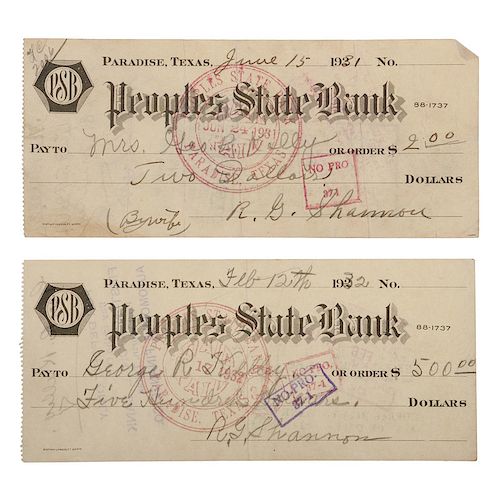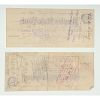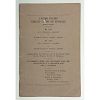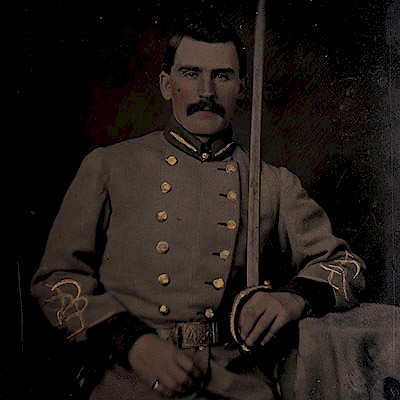George "Machine Gun" Kelly Signed Checks and Court Transcript with Bullet Hole
About Seller
6270 Este Ave.
Cincinnati , OH 45232
United States
With offices in Cincinnati, Cleveland and Denver, Cowan’s holds over 40 auctions each year, with annual sales exceeding $16M. We reach buyers around the globe, and take pride in our reputation for integrity, customer service and great results. A full-service house, Cowan’s Auctions specializes in Am...Read more
Two ways to bid:
- Leave a max absentee bid and the platform will bid on your behalf up to your maximum bid during the live auction.
- Bid live during the auction and your bids will be submitted real-time to the auctioneer.
Bid Increments
| Price | Bid Increment |
|---|---|
| $0 | $25 |
| $500 | $50 |
| $1,000 | $100 |
| $2,000 | $250 |
| $5,000 | $500 |
| $10,000 | $1,000 |
| $20,000 | $2,500 |
| $50,000 | $5,000 |
| $100,000 | $10,000 |
About Auction
Jun 22, 2018
Cowan’s American History: Premier Auction, scheduled for June 22, 2018 is comprised of early photographs, documents, manuscripts, broadsides, flags, and more dating from the Revolutionary War, the Civil War, Late Indian Wars, World War I and II and beyond. Cowan's Auctions dawnie@cowans.com
- Lot Description
Lot of 4 items. Two checks, both drawn on the Peoples State Bank, Paradise, Texas, on the account of R.G. Shannon. One made out to George R. Kelley (with "ey") for $500. Endorsed on verso and stamped for deposit to the First National Bank of Fort Worth, TX, Automobile Finance Co. Dated February 12, 1932. Second is made out to Mrs. George Kelly (no "e"), with "By wife" below R.G. Shannon. This check was for only $2, dated June 15, 1931. Endorsed "Mrs. Geo. R. Kelly" and stamped payable to the First National Bank, and Gulf Refining Co.
Robert Green "Boss" Shannon (1877-1956) was born in Arkansas and attended a one-room log church/school. His mother gave him the nickname "Boss" at an early age. In 1895 the Shannons moved to Texas, but Robert returned to Arkansas often to visit friends and relatives. His first two wives were sisters from his hometown, Mary Icye and Maude H. Jackson. After Maude died in 1923 Robert married Ora Coleman Brooks (1928). Ora's daughter from her first marriage was Cleo Lera Mae Brooks (named after Cleo Epps, Tulsa bootlegger), who changed her name to the more elegant-sounding "Kathryn" (or "Kit") while still in the eighth grade. After three brief marriages (or possibly four if, R.L. "Little Steve" Stephens is to be believed, the first being Lonnie Clyde Fry, then L.E. Brewer, and Charlie Thorne), Kathryn married George Frances Barnes, who was going by George R. Kelly by this time.
George Francis Barnes (1895-1954) was raised in an upper-middle class Memphis household. He made money while still in high school by bootlegging during Prohibition. In his second semester of college, he eloped with the daughter of a Memphis contractor. He worked for his father-in-law, drove a cab, started a goat farm, but eventually returned to bootlegging. His wife filed for divorce when he did so.
After he became known to Memphis police, he changed his name to George R. Kelly and drifted to New Mexico. There he was convicted of bootlegging and spent a few months in a New Mexico prison. After his release, he moved to Oklahoma (Tulsa, mostly), where he continued running liquor (including onto Indian Reservations) and robbed a few stores for supplemental income. Eventually he was convicted of bootlegging there and sentenced to Leavenworth. Some have called this time a "two-year tutorial in bank robbing." His fellow prisoners included Harvey Bailey ("King of the Heist men") and Frank "Jelly" Nash (last Oklahoma train robbery). After his release in 1930, he hooked up with Bailey and began working with him in "banking."
Either George got tired of robbing banks, or his marriage to Kathryn propelled him to "greater things." In January 1932, George snatched Howard Woolverton and his wife in South Bend, Indiana. Howard was the son of the local bank president, but the Woolvertons claimed to have no available cash. The younger man gave Kelly a promissory note to pay $50,000 after three days of captivity. The note, not surprisingly, was never paid, and the Woolvertons never responded to George and Kathryn's demands for payment.
It was Kathryn who then went out to buy a Thompson machine gun in Feb. 1933 and forced George, who seems to have not really liked guns, to practice with the weapon every day before cocktail hour could begin. After some prominent (and successful) kidnappings, the Kellys and Albert Bates decided to try again, even though a second attempt had failed.
Kathryn was involved in planning every detail, and scanned the society pages of the paper looking for appropriate targets. They settled on oil tycoon Charles Urschel. Kelly and Bates burst into the Urschel home on the evening of July 22, 1933, while Charles and his wife were playing bridge with Walter Jarrett and his wife. When the group refused to identify Urschel, the kidnappers took both men. During the ride, Kelly and Bates picked up enough conversation between the men to figure out who was whom, and released Jarrett with enough cab fare to get home.
Unfortunately for George and Albert, Urschel had a photographic memory, and paid attention to everything along the way, even though he was blindfolded (at the beginning he apparently could see bits of the road and his captors until they "fixed" that glitch). Charles knew they passed through oil fields, he memorized turns and other features of the road. He was held in a remote farmhouse and noticed that a plane went overhead at 9:45 am and 5:45 pm (he asked his captors, who he suspected were father and son, the time, since they took his watch).
After the Lindbergh kidnapping, the crime was placed under Federal jurisdiction if state lines were crossed. J. Edgar Hoover took a personal interest in this case. Between Urschel's memory and the FBI resources, law enforcement was able to work out where Urschel was held in record time. The American Airlines Fort Worth to Amarillo flight went over Paradise, Texas as 9:45 and 5:45 each day. Agents disguised as mortgagers went to Paradise, and quickly identified the Shannon's farm as the likely place where Urschel was held, even though mild-mannered "Boss" Shannon had never run afoul of the law before, and was generally respected by his neighbors in Wise County. But his step-daughter was Kelly's wife. They captured Harvey Bailey, with a machine gun nearby and pockets full of ransom cash.
The ransom was picked up and delivered by third parties (and not approved by the FBI). Only about half of the $200,000 ransom was ever found, and none was in the possession of George or Kathryn Kelly. The Kellys went on the run, and it was nearly two months before they were arrested in Memphis, at the home of George's first wife's brother (who seems to have had no idea that his ex-brother-in-law was "Machine Gun" Kelly).
Shannon admitted to "watching over" Kelly's kidnapping victim, but insisted that he was forced to do so. The checks certainly indicate that he had some dealings with his wife's son-in-law, possibly aiding in money laundering by running the robbery cash through what probably looked like a perfectly innocent account.
J. Edgar Hoover rounded up everyone he could find even remotely associated with this crime. Twenty-one people were convicted, 6 received life sentences. R.G. Shannon was sentenced to life, but released after 11 years by President Roosevelt, returning to Paradise in 1944, where he died in 1956. Ora and Kathryn both received life sentences, and served 25 years. They were released pending an appeals trial which never took place. They lived quietly in Oklahoma City, Ora passing away in 1980 followed by Kathryn 5 years later. George Francis R. "Machine Gun Kelly" Barnes served 21 years in Alcatraz and Leavenworth, where he died in 1954.
The lot also includes two printed books from the trials and appeals. The first, from the Tenth Circuit Court of Appeals, "No. 1157, R.G. Shannon, Appellant vs. United States of America, Appellee and No. 1158, Ora L. Shannon, Appellant vs. United States of America, Appellee. Statement, Brief and Argument for the Appellants R.G. Shannon and Ora L. Shannon. By McLean Scott & Sayers, Joe S. Moss, and Burch & Woodruff, Attorneys for Appellants." 8vo, printed paper wraps, 31pp. This booklet has what appears to be a bullet hole in the upper quarter (through "Court" in the title).
Second booklet is a "Transcript of Record, United States Circuit Court of Appeals, Tenth Circuit. No. 1133, Kathryn Throne Kelly, Appellant, vs. United States of America, Appellee. Filed August 21, 1934." 8vo, printed wraps, 50pp.
Generally very good, other than as above. Spine of second booklet a bit frayed.Condition
Eliminate the Hassle of Third-Party Shippers: Let Cowan's Ship Directly To You!
If you'd like a shipping estimate before the auction, contact Cowan's in-house shipping department at shipping@cowans.com or 513.871.1670 x219. - Shipping Info
-
Buyers are required to pay for all packing, shipping and insurance charges. Overseas duty charges are the responsibility of the successful Bidder. Be aware that for larger and/or valuable items, shipping charges can be substantial. - If there is no shipping amount on listed your invoice, you will need to make arrangements to pick up or ship your purchase through an alternative shipping company. Our shipping department can be contacted at 513.871.1670 (ext. 219) or email shipping@cowans.com. - Shipping charges include insurance for your order while in transit. If you have private insurance we will adjust your charge to include only packing and shipping. - Please allow 14 – 21 days after payment to package and ship your purchase as carefully as possible.
-
- Buyer's Premium



 EUR
EUR CAD
CAD AUD
AUD GBP
GBP MXN
MXN HKD
HKD CNY
CNY MYR
MYR SEK
SEK SGD
SGD CHF
CHF THB
THB













